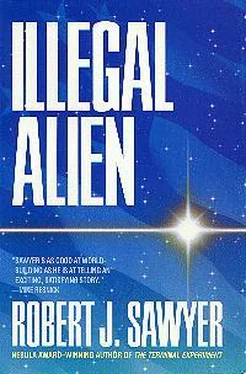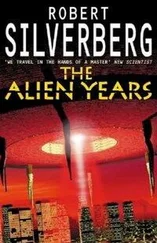“How do you close wounds?” asked Stant. His translated voice was difficult for Frank to make out over the staticky speakers in the observation gallery.
“With suture,” said Hernandez. “We sew the wound shut.”
Stant was quiet for a moment, perhaps appalled by the barbarism of it all.
“Oh,” he said at last. “You can do it, then.” He stepped aside, and Hernandez moved in over the wound, and, in a matter of about two minutes, had it neatly closed.
“When will he regain consciousness?” said Hernandez.
“Do you have ascetic acid?”
“Ascet—do you mean vinegar? Umm, maybe in the cafeteria.”
“Get some. A small amount given orally should wake him up.” Stant looked at Hernandez. “Thank you for your help.”
“It was an honor,” said Hernandez.
Hask was still recuperating the next day, and so court could not sit; the defendant had to be present for all testimony. But Dale and Linda Ziegler started the day in Judge Pringle’s chambers. “Your Honor,” said Ziegler, “the People would like to move for a mistrial.”
Judge Pringle was obviously expecting this. She nodded, and began writing on a legal pad. “On what grounds?”
“On the grounds that, given that our jury is not sequestered, its members have doubtless become aware of the fact that an attempt has been made on the defendant’s life.”
Dale spoke firmly. “Your Honor, the defense is quite content with the current jury. We vigorously oppose the motion to throw so many months of work—not to mention so many thousands of taxpayer dollars—out the window.”
Ziegler’s voice had taken on an earnest note. “Your Honor, surely seeing the defendant staggering into the courtroom all bandaged up will cause the jury to feel undue sympathy toward him, sympathy that could color their verdict in this case.”
Judge Pringle raised her eyebrows. “You’re not going to find another twelve people anywhere who haven’t heard about the shooting of Hask, Ms. Ziegler.”
“And,” said Dale, “surely knowing that at least one person felt so strongly that Hask was evil would have a prejudicial effect against my client.”
“Your Honor, if counsel thinks it’s prejudicial, then he should be arguing for a mistrial, too,” said Ziegler sharply. “The reason he isn’t is obvious: this fanatic, this Jensen, clearly felt Hask was going to go free, or he wouldn’t have bothered trying to kill him. His act is a clear signal to the jury of how they are being read.”
“Being read by one person,” said Dale, also facing Pringle. “Anyway, I’m sure there’s no need to remind my colleague of this, but Hask was supposedly under the protection of the LAPD when the attempt was made on his life. The State is at fault here; let’s not compound the State’s damage to my client by asking him to go through another trial.”
“But the prejudicial effect—”
“As Ms. Ziegler surely knows, Your Honor, I’ve built my whole career on believing that juries can rise above their prejudices. Ms. Katayama and I have faith in this one.”
“What’s the case law?” asked Judge Pringle. “I can think of cases where the defendant was killed during the trial, but I can’t think of any offhand where he was shot but survived.”
“We haven’t found anything yet,” said Ziegler.
“Well, unless you get me something compelling, I’m inclined to agree with Mr. Rice. Mistrials are expensive.”
“In that case, Your Honor,” said Ziegler, “may I request a special jury instruction?”
Drucilla Pringle frowned, but then nodded. “Agreed. I’ll advise them that they are to avoid any feelings of sympathy because the defendant is injured.” She turned to Dale. “And I’ll also instruct them that they are in no way to take the fact that Hask was considered a devil by one man to be any indication of his guilt.”
Carla Hernandez was never home during the day to watch the live coverage of the Hask trial. CNN did an hour-long recap at 9 P.M. Pacific, but that was more than she had time for; her job as chief of surgery required at least an eighty-hour week. Besides, she’d gotten sick enough of Greta Van Susteren and Roger Cossack during the two Simpson trials. Fortunately, every L.A. station had its own nightly special on the trial; she was partial to Bob Pugsley’s 10:30 p.m. commentary on Channel 13.
She’d thought that after she’d assisted Stant in operating on Hask, her involvement with the Tosoks would cease. But she’d seen something when prepping Hask for surgery, something that bothered her. Something she couldn’t explain.
There, on the TV, was Dale Rice, surrounded by a hundred reporters outside the courthouse. They were shouting questions at him about his client’s chances and the effect the shooting would have on the case.
Of course, Rice would have an unlisted home number—that was something most doctors and lawyers had in common. But he must have a business listing—although Hernandez had no idea what Rice’s firm’s name was. Still, it was worth a try. She got up and found her phone book.
A firm called Rice and Associates did indeed have offices on West Second Street.
She’d call them tomorrow.
Frank came by Rice and Associates each morning at eight-thirty for a quick update on the day’s strategy. When he entered Dale’s office this morning, Dale leaned back in his chair and interlocked his thick fingers behind his head. “I think Stant did it.”
Frank’s eyebrows went up. “Why?”
“Well, he took the Fifth on testifying about blood—so he’s got something to hide. And, more than that, he’s trained as a surgeon—he performed the bullet extraction from Hask, after all. The murderer was somebody who clearly had medical skill.”
“But what about his alibi?”
Dale shrugged. “His alibi is entirely other Tosoks. They were all seated alone at the back of the lecture hall—they’d put in Tosok chairs them behind the last row of normal chairs. Stephen Jay Gould’s lecture was illustrated with slides, and it lasted seventy-five minutes, before the houselights were brought up for a question-and-answer session. The theater is only five minutes from the dorm. Stant could have easily slipped out—excusing himself to use the bathroom, maybe—done the deed, and returned. He’s got his own key for the dorm; he could have entered through the back door.”
“Unseen?” said Frank. “Going clear across the campus?”
“It was a dark night, and it was during Christmas holidays—the university was mostly deserted.”
Frank scratched his chin. “I suppose. So you want to demonstrate that there’s enough slack in the prosecution’s time line for this to be possible?”
Dale nodded. “It’s a little late for a new strategy, but the shadow jury is still saying Hask is almost certainly going to be convicted if we don’t come up with something new; I’d hoped the shooting of Hask would have swayed them toward leniency, but apparently it didn’t.”
“You won’t get any help from the Tosoks if they’re shielding Stant—and I’m not sure why they’d want to protect him at the expense of Hask.”
“Hask said it himself,” said Dale. “He is ‘First’—the most expendable member of the crew. Kelkad may have decided that if someone has to take the fall for this, it should be Hask.”
Frank considered this, then nodded. “And Hask seems to be a loyal enough officer that he’s willing to abide by that.”
“Exactly.” Dale looked at his antique brass desk clock. “We better get going.”
“Rice and Associates.”
“Hello. Dale Rice, please.”
“Mr. Rice has already left for the courthouse. Would you like to leave a message?”
Читать дальше











